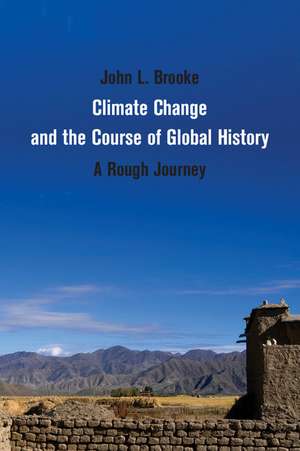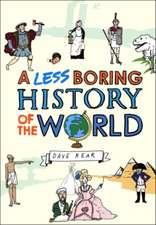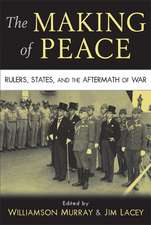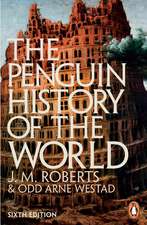Climate Change and the Course of Global History: A Rough Journey: Studies in Environment and History
Autor John L. Brookeen Limba Engleză Paperback – 16 mar 2014
| Toate formatele și edițiile | Preț | Express |
|---|---|---|
| Paperback (1) | 243.02 lei 3-5 săpt. | |
| Cambridge University Press – 16 mar 2014 | 243.02 lei 3-5 săpt. | |
| Hardback (1) | 767.48 lei 6-8 săpt. | |
| Cambridge University Press – 16 mar 2014 | 767.48 lei 6-8 săpt. |
Din seria Studies in Environment and History
-
 Preț: 137.74 lei
Preț: 137.74 lei -
 Preț: 188.70 lei
Preț: 188.70 lei -
 Preț: 234.83 lei
Preț: 234.83 lei -
 Preț: 156.89 lei
Preț: 156.89 lei -
 Preț: 204.55 lei
Preț: 204.55 lei -
 Preț: 147.64 lei
Preț: 147.64 lei -
 Preț: 201.67 lei
Preț: 201.67 lei - 14%
 Preț: 771.56 lei
Preț: 771.56 lei -
 Preț: 231.54 lei
Preț: 231.54 lei -
 Preț: 191.12 lei
Preț: 191.12 lei -
 Preț: 239.72 lei
Preț: 239.72 lei -
 Preț: 231.59 lei
Preț: 231.59 lei -
 Preț: 200.99 lei
Preț: 200.99 lei -
 Preț: 206.52 lei
Preț: 206.52 lei -
 Preț: 199.05 lei
Preț: 199.05 lei -
 Preț: 431.15 lei
Preț: 431.15 lei -
 Preț: 322.04 lei
Preț: 322.04 lei -
 Preț: 204.48 lei
Preț: 204.48 lei -
 Preț: 299.23 lei
Preț: 299.23 lei -
 Preț: 332.81 lei
Preț: 332.81 lei -
 Preț: 239.55 lei
Preț: 239.55 lei -
 Preț: 225.79 lei
Preț: 225.79 lei -
 Preț: 285.93 lei
Preț: 285.93 lei -
 Preț: 270.25 lei
Preț: 270.25 lei -
 Preț: 275.85 lei
Preț: 275.85 lei -
 Preț: 323.05 lei
Preț: 323.05 lei -
 Preț: 208.68 lei
Preț: 208.68 lei - 11%
 Preț: 432.64 lei
Preț: 432.64 lei -
 Preț: 252.69 lei
Preț: 252.69 lei -
 Preț: 278.72 lei
Preț: 278.72 lei -
 Preț: 272.97 lei
Preț: 272.97 lei - 11%
 Preț: 528.82 lei
Preț: 528.82 lei - 14%
 Preț: 756.70 lei
Preț: 756.70 lei -
 Preț: 264.09 lei
Preț: 264.09 lei -
 Preț: 440.76 lei
Preț: 440.76 lei
Preț: 243.02 lei
Nou
Puncte Express: 365
Preț estimativ în valută:
46.50€ • 48.55$ • 38.49£
46.50€ • 48.55$ • 38.49£
Carte disponibilă
Livrare economică 14-28 martie
Preluare comenzi: 021 569.72.76
Specificații
ISBN-13: 9780521692182
ISBN-10: 0521692180
Pagini: 648
Ilustrații: 49 b/w illus. 3 maps 7 tables
Dimensiuni: 152 x 228 x 36 mm
Greutate: 0.84 kg
Ediția:New.
Editura: Cambridge University Press
Colecția Cambridge University Press
Seria Studies in Environment and History
Locul publicării:New York, United States
ISBN-10: 0521692180
Pagini: 648
Ilustrații: 49 b/w illus. 3 maps 7 tables
Dimensiuni: 152 x 228 x 36 mm
Greutate: 0.84 kg
Ediția:New.
Editura: Cambridge University Press
Colecția Cambridge University Press
Seria Studies in Environment and History
Locul publicării:New York, United States
Cuprins
Introduction: growth, punctuation, and human well-being; Part I. Evolution and Earth Systems: 1. The court jester on the platform of life; 2. Human emergences; Part II. Domestication, Agriculture, and the Rise of the State: 3. Agricultural revolutions; 4. The Mid-Holocene and the urban-state revolution; 5. Human well-being from the Pleistocene to the rise of the state; Part III. Ancient and Medieval Agrarian Societies: 6. Stasis and growth in the epoch of agrarian empires; 7. Optimum and crisis in early civilization, 3000–500 BC; 8. A global antiquity, 500 BC–AD 542; 9. The global dark and middle ages, AD 542–AD 1350; Part IV. Into the Modern Condition: 10. Climate, demography, economy, and polity in the late medieval-early modern world, 1350–1700; 11. Global transformations: atlantic origins, 1700–1870; 12. Launching modern growth: 1870 to 1945; 13. Growth beyond limits: 1945 to present; Coda. A rough journey into an uncertain future.
Recenzii
'Think of this as travel writing of the highest order. A rough journey for mankind becomes a stimulating armchair adventure for the reader. This is big history, framed by big ideas but anchored in the very recent explosion of knowledge about climate through the ages and about our history and prehistory. Brooke skillfully navigates the interpretive hazards of proxy paleoclimate data. In Brooke's persuasive account, our evolution to modernity is not absolutely determined by climate and disease, but it has been substantially influenced by them. Our new knowledge shows that quite often these influences abruptly change course, and Brooke shows that much of our history is a consequence of societies scrambling to adjust.' Mark A. Cane, G. Unger Vetlesen Professor of Earth and Climate Sciences, Lamont-Doherty Earth Observatory, Columbia University
'John Brooke skillfully joins a vast scientific literature to the historiography of virtually every major region to argue that climatic shifts always have been the primary agency determining the pace and direction of human development. He thus offers an unprecedentedly coordinated global chronology as well as a nuanced, distinctly original understanding of the relation between endogenous and exogenous forces. A jaw-dropping tour de force.' Victor Lieberman, Raoul Wallenberg Distinguished University Professor of History, University of Michigan
'Readers with advanced degrees in meteorology, archaeology, economics and world environmental history will easily comprehend Brooke's magisterial survey-synthesis. For others, it poses an interesting challenge. The author's mastery and referencing of the vast technical literature in different disciplines is remarkable. … The author also explains seven phases of climate history since 3000 BCE and three industrial revolutions. The consequence is a fundamental change from a lightly populated world controlled by nature to a heavily populated world controlled by both nature and human agency. Summing up: highly recommended.' F. N. Egerton, Choice
'… a wide-ranging work starting with our pre-human and early human ancestor and ending with a consideration of future trajectories … One of the reviews on the back cover has called it 'a jaw-dropping tour de force'; spanning, as it does, millennia and continents, it is hard to argue with that conclusion.' Carleton Jones, The Journal of Irish Archaeology
'John Brooke skillfully joins a vast scientific literature to the historiography of virtually every major region to argue that climatic shifts always have been the primary agency determining the pace and direction of human development. He thus offers an unprecedentedly coordinated global chronology as well as a nuanced, distinctly original understanding of the relation between endogenous and exogenous forces. A jaw-dropping tour de force.' Victor Lieberman, Raoul Wallenberg Distinguished University Professor of History, University of Michigan
'Readers with advanced degrees in meteorology, archaeology, economics and world environmental history will easily comprehend Brooke's magisterial survey-synthesis. For others, it poses an interesting challenge. The author's mastery and referencing of the vast technical literature in different disciplines is remarkable. … The author also explains seven phases of climate history since 3000 BCE and three industrial revolutions. The consequence is a fundamental change from a lightly populated world controlled by nature to a heavily populated world controlled by both nature and human agency. Summing up: highly recommended.' F. N. Egerton, Choice
'… a wide-ranging work starting with our pre-human and early human ancestor and ending with a consideration of future trajectories … One of the reviews on the back cover has called it 'a jaw-dropping tour de force'; spanning, as it does, millennia and continents, it is hard to argue with that conclusion.' Carleton Jones, The Journal of Irish Archaeology
Notă biografică
Descriere
The first global study by a historian to fully integrate the earth-system approach of the new climate science with the material history of humanity.










